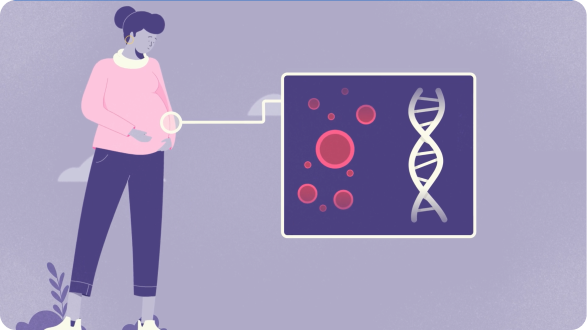

Know more about my baby sooner
More and more specialized screening options are becoming available to help you learn more about your baby’s development.
The major screening and testing milestones
Throughout your entire pregnancy, genetic screening and diagnostic testing can give you a lot of helpful insights and information—like whether your baby might have a genetic condition.
See the prenatal testing timeline
Indicates genetic screening or testing
Indicates ultrasound
Indicates diagnostic testing
Indicates newborn screening
Genetic screening during pregnancy
From the initial weeks of pregnancy, genetic screening can give parents-to-be important information about their baby’s health and something even more valuable: the time to turn that newfound knowledge into a plan.

Knowing baby’s gender
Just six weeks into pregnancy you can do an at-home test that can predict the sex of your baby with greater than 99% accuracy.1
-
Learn more about gender tests
SneakPeek® Early Gender Test: > 99% accuracy at six weeks1
SneakPeek is an easy and accurate three-step home test that helps you learn the sex of your baby. Once we receive your sample, you have the option to get results within a day.

Getting insight into baby’s development
Cell-free DNA (cfDNA) genetic screening can tell you if your baby is at high risk for a specific, serious genetic condition. Importantly, it can help you learn more and prepare.
-
Learn more about cell-free DNA screening
What is cfDNA screening?
cfDNA screening is non-invasive and can occur as early as eight weeks into your pregnancy to determine if your baby has a high risk of certain chromosome conditions.
What types of conditions can it screen for?
cfDNA screening can tell if a pregnancy is at risk for a variety of conditions, including Down syndrome, Edwards syndrome, or Patau syndrome.
Are all cfDNA screens the same?
No. Factors like BMI, IVF pregnancies, and twins can affect the results for certain screens.
Prequel® Prenatal Screen: Delivers results to more than 99.9% of patients.2
Prequel is the only cfDNA screen that delivers reliable answers to over 99.9% of people who screen at 10 weeks, regardless of BMI.2

Understanding the chance of passing down inherited conditions
Carrier screening makes parents aware of their risk of passing down an inherited condition to their children.
-
Learn more about carrier screening
What is carrier screening?
Carrier screening lets parents know if they are at increased risk of passing down specific inherited conditions. Medical experts recommend that everyone looking to start or grow their family is offered carrier screening before or during pregnancy.
What types of conditions can it screen for?
Carrier screening allows partners to assess their reproductive risk for conditions including spinal muscular atrophy, cystic fibrosis, fragile X syndrome, and more.
Are all carrier screens the same?
No. Look for the screens with the highest at-risk couple detection rate across ethnicities, panels that are customizable to detect the most relevant conditions, and a proven, peer-reviewed track record.
Foresight® Carrier Screen
Only Foresight offers parents-to-be multiple panel choices that screen for up to 272 genes associated with serious conditions, and a greater than 99% detection rate for the vast majority of the conditions.3
How screening can help guide pregnancy
See how Hannah used cell-free DNA screening to anticipate the possible needs of her baby after birth, then find specialist care, a support network, and the appropriate medical facility.

REFERENCES
- Sneakpeektest. https://sneakpeektest.com/wp-content/uploads/2021/01/Large-scale-follow-up-research-study-SneakPeek-Early-Gender-DNA-Test-99.9-Accurate.pdf. Accessed April 12, 2024. Accessed April 12, 2024.
- Hancock S, et al. Clinical experience across the fetal‐fraction spectrum of a non‐invasive prenatal screening approach with low test‐failure rate. Ultrasound Obstet. Gynecol. 2020;56(3):422-430. doi:10.1002/uog.21904.
- Foresight® Residual Risk Table. https://myriad-library.s3.amazonaws.com/mwh/disease-detection-fact-sheet.pdf. Accessed December 21, 2023.

